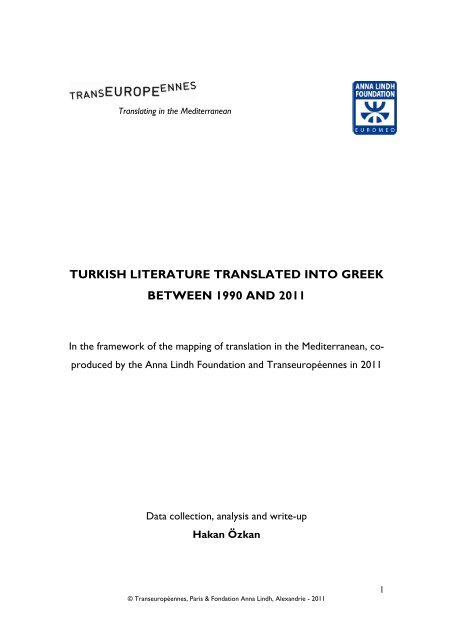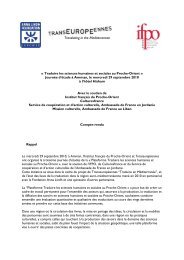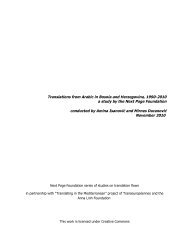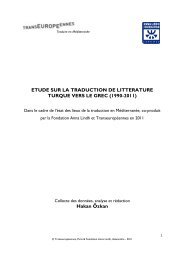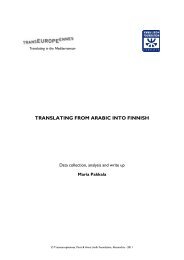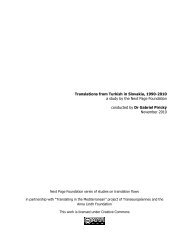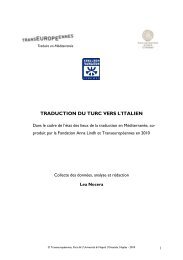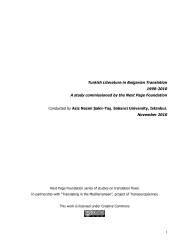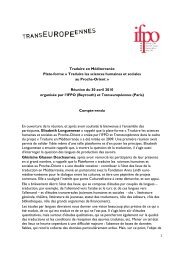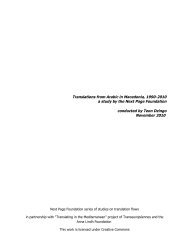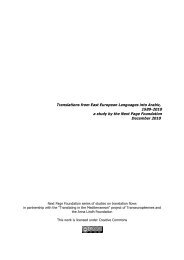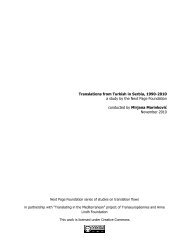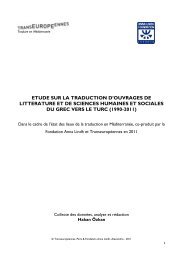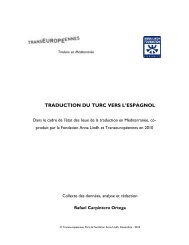TIM 2011 Turkish-Greek Hakan ÃZKAN - Transeuropéennes
TIM 2011 Turkish-Greek Hakan ÃZKAN - Transeuropéennes
TIM 2011 Turkish-Greek Hakan ÃZKAN - Transeuropéennes
Create successful ePaper yourself
Turn your PDF publications into a flip-book with our unique Google optimized e-Paper software.
published this number decreased to 3 in the 1950s and to one in the 1960s which was due to therising oppression by the <strong>Greek</strong> junta. After 1974 when the junta was brought down, translationsfrom <strong>Turkish</strong> rose steeply: 22 in the 1970s, and 41 in the 1980s.The four books translated in the 1940s are: An anthology of <strong>Turkish</strong> poetry of the years 1919-1939, an anthology of <strong>Turkish</strong> prose, a theatre play by Nazım Hikmet, and a short story by thenovelist Refik Halit Karay.In the following decades publishers preferred works by the poet Nazım Hikmet (18 titles), thesatirist Aziz Nesin (16 titles), the novelist Yaşar Kemal (9 titles), and by the novelist NecatiCumali (3 titles) who wrote about life on the Aegean coast (for example Πικρός καπνός,original title: Acı Tütün, tr. Bitter Tobacco, translated by Petros Markaris, published byThemeliora in 1979).In Social Sciences, <strong>Turkish</strong> books were not at all represented in Greece. Only in 1976 the firstbook which deals with <strong>Turkish</strong> politics (Title: Turkey in a Dead-End) was published. 10 Beginningwith the downfall of the junta regime in 1974 publications in Social Sciences rose constantly.10 Bekir Kamuran Harputlu, Η Τουρκία σε αδιέξοδο (tr. No way out: Turkey) Translated by Monika Vlaxu,Athens 1976.© Transeuropéennes, Paris & Fondation Anna Lindh, Alexandrie - <strong>2011</strong>5
countries of course). Ari Çokona explains this disparity as follows: for Turkey Greece is oneneighbour among many others, but for Greece Turkey is by far the biggest and mostintriguing neighbour with its ethnically, socially and culturally multi-layered 74-millionpopulation, its powerful army. Furthermore the conflict over the Aegean still smoulders andthe Cyprus issue is not settled. <strong>Greek</strong>s try to understand the dynamics that rule Turkeyprimarily because of mere interest in the big neighbour in the East, but also because Turkeyis perceived as a threat.2.1.2 Predominant authors and themes in belles-lettresSome authors that were translated during the 70s and 80s did not enjoy the same interest inthe following decades. Only four works of Aziz Nesin who together with the poet NazımHikmet was the most featured author of the 1970s and 1980s have been translated in the1990s. In the 2000s no translation of Nesin was published. The same is true for Yaşar Kemalwhose novels were translated mainly in the 1980s and 1990s. Nazım Hikmet instead enjoyedrenewed publication of his known and yet unknown works (poetry and plays). 10 of hisworks have been translated throughout the 1990s and 2000s.I already mentioned that the translation of poetry decreased sharply in the 1990s and 2000s.This of course occurred because of the publishers’ economic considerations; they do notearn on poetry books. Meanwhile <strong>Turkish</strong> poetry is still being translated and published in<strong>Greek</strong> literary magazines such as Δέντρο, Ελλέβορος, Η Λέξη, and Τοµές for example whoalso published special issues and features on <strong>Turkish</strong> literature (Çokona 2009: 75).Among the writers that emerged or became famous in the 1990s and 2000s are of courseOrhan Pamuk (10 titles, most of them published in the 1990s), but also other novelists asMurathan Mungan (7 titles, all in the course of the 2000s), Nedim Gürsel (3 titles in the1990s, 3 titles in the 2000s), and Duygu Asena (3 titles in the 1990s, 3 titles in the 2000s).As to preferred subjects the most conspicuous is love and the city of Istanbul (Gr.Κωνσταντινούπολη, Konstantinoupoli) or both together. Istanbul seems to be the realhero of many a novel: Murathan Mungan’s Son Istanbul (tr. The End of Istanbul, Gr. Το τέλοςτης Πόλης) is one of the numerous examples. Publishers even ask translators to scroungethe market for novels that deal with love and in some way involve The City (Gr. Πόλη,Poli) as Istanbul is still fondly and evocatively called among <strong>Greek</strong>s.Publishers also tend to put the name of Istanbul or the Bosphorus in the <strong>Greek</strong> title of thebook even if it does not occur in the original title as in Zülfü Livaneli’s novel Engereğin© Transeuropéennes, Paris & Fondation Anna Lindh, Alexandrie - <strong>2011</strong>7
Gözündeki Kamaşma (tr. The Viper’s Dazzled Eye) which in the <strong>Greek</strong> title turns into Οµεγάλος ευνούχος της Κωνσταντινούπολης (tr. The Great Eunuch ofKonstantinoupoli). This preference is also expressed by the choice of the cover which oftendepicts most conspicuous monuments or features of the city as in Sergün Ağar’s book AşkınSamatya’sı Selanik’te kaldı (tr. The love of Samatya remained in Salonica; Samatya is a quarterin Istanbul) which is rendered in <strong>Greek</strong> as Φίλησα µια φορά την Ευδοξία (tr. I oncekissed Eudoksia). Interestingly, in the <strong>Greek</strong> title neither Samatya nor Istanbul arementioned. On the cover, however, we see a woman’s eyes looking at us from over theHagia Sophia, the most important symbol of Byzantine or <strong>Greek</strong> presence in the city:The cover of the original <strong>Turkish</strong> edition does not include any reference to Istanbul butshows a woman of past centuries sitting on a couch with floral motives:© Transeuropéennes, Paris & Fondation Anna Lindh, Alexandrie - <strong>2011</strong>8
special series or programmes for <strong>Turkish</strong> literature as Belge in Turkey does for <strong>Greek</strong>books with their Marenostrum series.It is remarkable that 70% of the <strong>Greek</strong> readership is female. A fact that may play animportant role in the choice of books that are published (Çokona 2009 ibid.).When choosing <strong>Turkish</strong> literature publishers mostly rely on the advice of their translators(Çokona 2009, 76). They also screen the major European and American markets; as soon astitles of <strong>Turkish</strong> writers crop up in the reviews of these countries, <strong>Greek</strong> publishers showinterest in publishing works of the author in question. Katia Lempesi of the publisher Kedrosthat published the detective novels of Ahmet Ümit, the prose of Mehmet Coral, and AyşeKulin states that they pick <strong>Turkish</strong> titles that are of “substantial interest” without going intodetail what this substantial interest may be (Siafkou 2006). In lack of literary agencies, <strong>Greek</strong>publishers more and more contact their <strong>Turkish</strong> counterparts directly after having madetheir acquaintance on large book fairs as the Frankfurt Book Fair. An important catalystevent was the 2008 Frankfurt fair where Turkey was the guest of honour (Çokona 2009:77).Publishers do not employ correctors verifying the quality of the translation by referring backto the source text. Mostly lecturing of the target language is checked only. A notableexception is Kastaniotis where a famous translator for <strong>Turkish</strong> literature, Stella Xristidou,acts also as a corrector.3. Dissemination and availabilityThe large <strong>Greek</strong> bookstores as Πρωτοπορία in Salonica have the best-selling <strong>Turkish</strong> novels(Orhan Pamuk, Murathan Mungan, Nazım Hikmet) on their shelves. Πρωτοπορία alsomaintains an online bookstore where most of the titles in the appendix are available fordelivery within few days. Other online bookstores that offer <strong>Turkish</strong> books with someinformation on the work are www.greekbooks.gr, www.ebooks.gr and www.captainbook.gr.Some of these bookstores as for example www.ebooks.gr include routines that allow you tonarrow down your searches to <strong>Turkish</strong> literature or <strong>Turkish</strong> history etc. Sales prices of<strong>Turkish</strong> novels and books on Social Sciences average between 15 and 25 €.© Transeuropéennes, Paris & Fondation Anna Lindh, Alexandrie - <strong>2011</strong>10
4. Media and critical receptionAll major newspapers like Τα Νέα, Το Βήµα, Καθηµερινή, and Ελευθεροτυπία haveliterary supplements where reviews of books are published. In general these review are ofgood quality with occasional references to translation and translation quality (Çokona <strong>2011</strong>).Literary magazines like Δέντρο and Η Λέξη also review works that have been translatedfrom <strong>Turkish</strong>.5. Funding and SupportBeginning with 2005, funding is mostly provided by the <strong>Turkish</strong> Translation Project, TEDA.TEDA, a translation subvention program initiated by the <strong>Turkish</strong> government, subsidised 28titles (40%) of the 70 books published between 2005 and <strong>2011</strong>. Although they influenced theevolution of translations positively, it is not quantifiable exactly how big this influence was astranslations from <strong>Turkish</strong> to <strong>Greek</strong> were constantly on the rise until the middle of the2000s, i.e. until the year of TEDA’s creation. Furthermore, not all editors in Greece knowabout or want to go through the admittedly overestimated hassle of bureaucracy linked tothe application process (Çokona <strong>2011</strong>). 12 If we look at belles-lettres in the 2000s,disregarding subsidised books from TEDA, the total of translations has nearly doubled from40 titles in the 1990s to 78 titles in the 2000s. Neither is it clear to which extent the OrhanPamuk’s Nobel prize has affected publishing of <strong>Turkish</strong> literature since 2006. At least forOrhan Pamuk himself the award did not spark a wave of new publications of his œuvre asmost of his works had already been translated until then.Consequently, we cannot rule out that the books translated with the aid of TEDA wouldhave been published anyway. Therefore the TEDA’s role in promoting translations into<strong>Greek</strong> cannot be answered satisfactorily.The figures of publications in the realm of Social Sciences does not help to dispel thisuncertainty. While in the 1990s 9 titles were published in this area the number skyrocketedto 36 in the 2000s. As only 3 publications have been subsidised by TEDA their contributionto the quadrupling in works in Social Sciences is tiny.12 The role of TEDA and their decision process is disputed as it has been reported that in some instancesapplications were rejected because of political considerations (Çokona <strong>2011</strong>).© Transeuropéennes, Paris & Fondation Anna Lindh, Alexandrie - <strong>2011</strong>11
<strong>Turkish</strong>-<strong>Greek</strong> translations are eligible for EU funding (EU Education, Audiovisual & CultureExecutive Agency) 13 . According to Ari Çokona works that have been translated fromTurkısh into <strong>Greek</strong> have not received financial support by the above agency (Çokona <strong>2011</strong>).6. TranslatorsMany of the translators that translated or still translate <strong>Turkish</strong> literature into <strong>Greek</strong>originate from the <strong>Greek</strong> community in Istanbul. They are bilinguals who attended thebilingual primary and secondary schools in the various districts of Istanbul (Beyoğlu, Fener,Arnavutköy, Büyükada, and Karaköy). Among them are Panayot Abacı (who was the first totranslate eminent authors such as the novelist Yaşar Kemal, the satirist Aziz Nesin, and thepoet and novelist Rıfat Ilgaz), Stella Xristidou (novelists Orhan Kemal and Murathan Mungan),Petros Markaris (novelist Murathan Mungan) Herkül Millas (poets Can Yücel and YunusEmre), Fragko Karaoglan (novelists Zülfü Livaneli and Ahmet Hamdi Tanpınar), and IoÇokona (novelist Mehmet Murat Somer). Some of these also translate from <strong>Greek</strong> into<strong>Turkish</strong>: Panayot Abacı, Fragko Karaoglan, and Herkül Millas to name a few. As I explainedfurther above with regard to Avraam N. Papazoglu, the translators of the <strong>Greek</strong> communityof Istanbul play a major role in mediating between the two countries.Translators of <strong>Turkish</strong> literature generally cannot live on what they earn for theirtranslations. In most of the cases they have other jobs that sustain them or they do notdepend on the revenues that their translations generate. Fees can be very discouraging sothat translations remain a work fuelled by intrinsic motivation rather than remuneration.According to Ari Çokona, fees in Greece are not calculated by a percentage on the print runof a published work as it is in Turkey (Çokona <strong>2011</strong>). Instead translators usually get anagreed fee which can vary considerably. Further print runs do not entitle them to claim arenewal of that payment.7. Learning <strong>Turkish</strong> in Greece and TurkeyThe universities in Greece that provide instruction in <strong>Turkish</strong> language and literature are theUniversity of Athens, the Aegean University in Rhodes, the University of Macedonia inSalonica, the Thrace University in Komotini, and the Ionian University in Corfu. There are13 http://eacea.ec.europa.eu/culture/index_en.php. Accessed on 10 July.© Transeuropéennes, Paris & Fondation Anna Lindh, Alexandrie - <strong>2011</strong>12
also other institutions that teach <strong>Turkish</strong> language and literature as for example the Centerfor Oriental Language and Culture in Athens. To my knowledge there is no branch ordepartment that is dedicated to translation from <strong>Turkish</strong> to <strong>Greek</strong> and vice versa or fromOriental languages to <strong>Greek</strong> in general.There are other chiefly research-centred institutions that do not provide undergraduatecourses for students but rather postgraduate seminars and programmes in collaborationwith other universities, their main focus being to undertake research on <strong>Turkish</strong> politics,history, literature, and culture. They make known the results of their research throughjournals, books, organization of seminars and conferences. Two of these institutions areknown to me: the Institute for Balkan Studies in Salonica, and the Institute for MediterraneanStudies in Rethimno, Crete.Turkey: As noted above, <strong>Greek</strong>s in Istanbul learn <strong>Turkish</strong> alongside with <strong>Greek</strong> in primaryand secondary schools that are especially provided for them by the <strong>Turkish</strong> Ministry forEducation. Many of them also continue their education in <strong>Turkish</strong> Universities.© Transeuropéennes, Paris & Fondation Anna Lindh, Alexandrie - <strong>2011</strong>13
BibliographyAri Çokona (1999) Yunancaya Çevrilmiş Türk Edebiyatı (tr. <strong>Turkish</strong> literature translated into<strong>Greek</strong>) In: Çevirmenin Notu, 7, 73-88Ari Çokona (<strong>2011</strong>) interview on 16 August <strong>2011</strong>Episkopoulos, N. (1894) Τουρκική φιλολογία (<strong>Turkish</strong> Philology), ‘Αστυ, 28 March 1894.Karaoglou, X. et al. (1996) Περιοδικά Λόγου και Τέχνης (1901-1940) (Art and LiteratureMagazines, 1901-1940). Αθηναϊκά περιοδικά (1901-1925). Thessaloniki.Kayadelen, E. (2007) <strong>Greek</strong> Fiction Translated into <strong>Turkish</strong> 1990-2006, Boğaziçi University.Papazoglu, Avraam N. (1938). Βαλκανικοί Ορίζοντες (tr. Balkan Horizons), Athens 1938.Papazoglu, Avraam N. (1932). Ercüment Behzad: S.O.S. In: Νεα Εστία 11, 127, 380Pimplis, Manolis (2008) «Μαµά, τώρα θα βλέπω όνειρα στα τούρκικα;» (tr. “Mom,will I dream in <strong>Turkish</strong> now?”) In: Τα Νέα newspaper accessed on 29 July <strong>2011</strong>:http://www.tanea.gr/vivliodromio/?aid=4488351Rigopoulou, Dimitris (2009) Η Κρήτη, οι µουσουλµάνοι και ο δικός τους ξεριζωµός(tr. The Muslims of Crete and their Uprooting) In: Καθηµερινή newspaperaccessed on 29 July <strong>2011</strong>:http://news.kathimerini.gr/4dcgi/_w_articles_civ_1_20/03/2009_308262Siafkou, Xristos (2006) ‘Ελλας Τουρκία λογοτεχνία (tr. <strong>Greek</strong>, Turkey, Literature)accessed on 14 August <strong>2011</strong>:http://archive.enet.gr/online/online_text/c=113,dt=08.01.2006,id=68971544Zaragkalis, Thanos and Xarisiadou, Maria et. al. (2007) Τουρκική λογοτεχνία: Τούρκοιλογοτέχνες του εικοστού αιώνα. Τούρκοι λογοτέχνες γράφουν καιµιλούν για τους Ρωµιούς (<strong>Turkish</strong> literature: <strong>Turkish</strong> writers of the 20 thcentury. <strong>Turkish</strong> authors on the Rum), Athens 2007.© Transeuropéennes, Paris & Fondation Anna Lindh, Alexandrie - <strong>2011</strong>14


